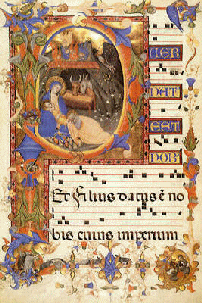
The ‘O Antiphons’
The Liturgy
Today, 17th December the liturgy begins a new phase of Advent, known as the Octave before Christmas. This period is characterised by the seven great ‘O Antiphons’ that derive their name from the first invocation of the Latin text.These antiphons will be sung or recited in the divine office of the Roman breviary over the next seven evenings at the singing of the Magnificat (Luke 1:46-55). They are also used at the gospel acclamation during the Eucharist for each of these days.
History
We are not sure when these texts were first introduced into the liturgy, however there is reference to them by Boethius (ca. 480-524) and they were well established in the liturgy by the Middle Ages. Over the centuries there have been variations in the text and number of the antiphons, but these seven seen to have been constant. The Benedictine monasteries, in particular kept alive the tradition of reciting these texts.
Literature
These short verses are gems of literature and have been the source of some of our most beautiful music and art. The texts of these antiphons are a distillation of seven images and titles from the Old Testament which were interpreted by the early Christian community as prefiguring Christ.
An echo of the antiphons is found in the eighteenth century hymn, Come, O Come Emmanuel.
Scripture
Those first followers of Jesus of Nazareth used their familiar heritage, i.e. the Jewish Scriptures and Apocrypha to understand who Jesus was, so they came to see him as the fulfilment of all the longings and hopes of their own Jewish ancestors. Over centuries of meditation on the mystery of Jesus, the Church, the believing community at prayer, distilled their belief in the Incarnation and Redemption into these seven texts. In doing this, they also expressed their longing for the fulfilment of God’s promises.
The individual Biblical origins of each text are too numerous to list here, however, they are steeped in the texts of Isaiah.
Advent Longing
These texts increase the sense in the Advent liturgy of longing for the coming of the Messiah, a longing that will bring about the final fulfilment of the Parousia. It is as if, in the words of St. Paul that ‘All creation is groaning in the act of giving birth..’. The whole sweep of creation and history is given voice.
The sequence of the titles of Christ in these antiphons is important because they begin with the very heart of the Trinity before creation in invoking O Wisdom, to God’s covenant at Sinai with the chosen people (O Adonai), to God’s promising a just ruler (O Root of Jesse; O Key of David) to God’s promise to all people.
So, the antiphons follow the sweep of salvation history and keep alive our hope for God’s action now in our world, our lives. They evoke that painful, joyful, hopeful longing of lovers for each other.
The Structure
The antiphons follow the traditional liturgical structure of an invocation which highlights one of the titles of the Messiah, followed by praise and then a petition.
It has been suggested by Professor Robert Greenberg of the San Francisco Conservatory of Music that the Benedictines deliberately arranged the order of the antiphons so that, reading the first letter of each from the last to the first gave the Latin, ero cras which means Tomorrow, I will come.
The Antiphons
The following are the antiphons with some biblical references for each text. They are by no means exhaustive.
O Sapientia (17 December)
O Wisdom, you come for the from the mouth of the Most High. You fill the universe and hold all things together in a strong yet gentle manner. O come to teach us the way of truth.
Over time, Wisdom became another name for God as well as a human attribute. Divine Wisdom (a feminine noun in both Hebrew and Greek) was God’s creating force and creation is not a once and for all event, God’s creating power never ends. Read the Book of Wisdom, a late text that, in many ways is a highly developed theology of Divine Wisdom.
Proverbs 8:22f Wisdom speaks: The Lord begot me, the firstborn of his ways, the forerunner of his prodigies of long ago; From of old I was poured forth, at the first, before the earth….When he established the heavens I was there, when he marked out the vault over the face of the deep….Then I was beside him as his child and I was his delight day by day, playing before him all the while, playing on the surface of his earth; and I found delight in the children of men.
Cf. Eccl 24:5; Sirach 24:30; Isaiah 11:2-3; 28:29; 40:14
O Adonai (18 December)
O Adonai and leader of Israel, you appeared to Moses in a burning bush and you gave him the Law on Sinai. O come and save us with your mighty power.
Adonai is a Hebrew title for God. It means The Lord. The Jewish people still do no use the name of God. Adonai suggests the Lawgiver. (cf. Exodus 3; 6:13; 20) We must not see the Law in our western terms as a set of rules. The Law for the Jewish people is about God’s relationship with them, it is the way to walk in this world, not some punishable set of rules. The Law is God’s great gift of self revelation to Israel and in turn, Israel’s response to God.
But He shall judge the poor with justice, and decide aright for the afflicted of the land….Justice shall be the band around his waist, and faithfulness the belt upon his hips (Is 11:4-5)
And he shall rule over the House of Israel (Matt 2:6)
Cf. Jer 32:21; Isaiah 33:22)
O Radix Jesse (19 December)
O Stock of Jesse, you stand as a signal for the nations; kings fall silent before you whom the peoples acclaim. O come to deliver us, and do not delay.
You only have to look at the great stained glass windows of the medieval cathedrals such as Chartres to understand how this image fell into Christian consciousness. It is the family tree of Jesus that echoes in the genealogies of Luke and Matthew. The genealogies of Jesus establish his human and divine credentials – and there are some interesting women in those lists.
A shoot shall sprout from the stump of Jesse, and from his roots a bud shall blossom (Isaiah 11:1)
Cf. Isaiah 11:4-5; 33:22; 52:15; Habakkuk 2:3; Micah 5:1; Luke 3:23-38; Matt: 1:1017
O Clavis David (20 December)
O Key of David and sceptre of Israel, what you open no one else can close again; what you close no one can open. O come to lead the captive from prison; free those who sit in darkness and in the shadow of death.
David came to epitomise the good ruler for Israel, particularly when they looked back over a history of kings who ranged from wise to wicked. David, for all his human frailty, or perhaps because of it, remained faithful to God. He committed appalling deeds, including murder, yet he profoundly repented; he brought the Arc of the Covenant (the ‘dwelling place’ of God) to Jerusalem and against all kingly dignity, danced before it; he lived his call to kingship with passion and through it all, tried to rule with justice for the people. Through all his human complexity, he knew himself to be chosen by God. He epitomised the faithful, just ruler and God promised the perfect leader would come through his descendants.
I will place the key of the House of David on his shoulder; when he opens, no one will shut, when he shuts, no one will open (Isaiah 22:22)
His dominion is vast and forever peaceful, from David’s throne, and over his kingdom, which he confirms and sustains by judgment and justice, both now and forever (Isaiah 9:1)
Cf. Revelation 3:7; Psalm 107:10
O Oriens (21 December)
O rising Sun, you are the splendour of Eternal Light and sun of justice. O come and enlighten those who sit in darkness and in the shadow of death.
For a traditional society such as Israel, imagine how the darkness of night could be full of danger from preying animals to preying humans. This applied whether people lived in villages or in the towns. Dawn brought safety. Also, lamplight was not all that clear, so dawn and light came to symbolise safety, enlightenment, a new beginning.
Think of nights you have spent sleepless because of some anxiety, and remember how it felt when the night gave way to the dawn. The problem may not have gone away, but there is usually a sense relief or hope.
‘Dayspring’; ‘Light’ became a title for God who will visit his people ‘like the dawn’
The people who walked in darkness have seen a great light; upon those who dwelt in the land of gloom a light has shone (Isaiah 9:1)
Cf. Malachi 3:20; Habakkuk 3:4; Psalm 107; Luke 1:78
O Rex Gentium (22 December)
O King whom all the peoples desire, you are the cornerstone which makes all one, O come and save us whom you made from clay.
The history of Israel is also the history of the evolution of its self-understanding and its mission. At first the Gentiles (or the Nations) were seen as hostile. God’s habitation was in Israel. God did not inhabit among the gentiles. It took centuries of living through prosperity and adversity; political power and exile for Israel to understand that it was called, not to be some holy enclave where God dwelt, but to be the place where all would see God. A sacrament of God’s presence, if you wish. It was during exile from their homeland that the Israelites came to know that God was beyond a particular place, God was indeed God of all peoples. That God desires the love of all people, not just Israel.
This was a momentous shift in theology. Read the Book of Job who is a holy gentile who God calls his friend; read the Book of Jonah, that great comedy. Jonah, a good Jew is sent by God to warn the people of Nineveh (gentiles) to repent. Much to Jonah’s annoyance they do and God blesses them. Jonah finds this very difficult and remonstrates with God for saving these gentiles. God replies, ‘And should I not be concerned over Nineveh, the great city, in which there are more than a hundred and twenty thousand persons, who cannot distinguish their right hand from their left, not to mention the many cattle?’
He shall judge between the nations, and impose terms on the nations. They shall beat their swords into ploughshares and their spears into pruning hooks; one nation shall not raise the sword against another, nor shall they train for war again. Isaiah 2:4
For a child is born to us, a son is given us; upon his shoulder dominion rests. His name is Wonder-Counsellor, Mighty God, Father Forever, Prince of Peace Isaiah9:5
Cf. Haggai 2:8; Gen 2:7; Ephesians 2:20
O Emmanuel
O Emmanuel, you are our king and judge, the One whom the peoples await and their Saviour. O come and save us, Lord, our God.
Of all the titles, this is probably the most familiar. In Israel, names have meaning. Names signify who a person is and often names change when that person’s mission or reality changes, for example Abram became Abraham and Jesus called Simon bar Jonah Peter, the rock.
Emmanuel is a symbolic name. It signifies who God is and who we are - God-with-us. This is the profound theological insight into God’s relationship with Israel, that through all its history – the good and the bad – God is with Israel and Israel is with God.
This Old Testament title takes on a deeper meaning as the early Christian community sought to understand who Jesus was. In his birth, life, death and resurrection, he is God-with-us. They came to see that in Jesus God has deepened that relationship so profoundly that they could now say that in Jesus they saw God incarnate, God enfleshed.
The Lord himself will give you this sign: the virgin shall be with child, and bear a son, and shall name him Emmanuel. Isaiah 7:14
Cf. Isaiah 8:8; Gen 49:10; Isaiah 33:2.
So, as the expectation of Advent increases, may each of you find the deepest desires of your hearts awakened and nourished by Emmanuel – God-with-us; God irrevocably committed to us. In the great liturgical cry of the very early church -Maranatha – Come, Lord Jesus.





